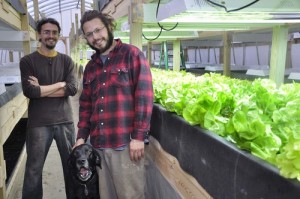In examining the current production scene in CNY, we visited Allan Gandelman of Main Street Farms. Main Street Farms is an aquaponics urban farm operation with locations in Homer and Cortland, NY. On a brief note, aquaponics is essentially a mix between aquaculture (to raise Tilapia) and hydroponics to grow produce. Hydroponics uses waste from farm-raised Tilapia to fertilize produce. Once the plants uptake the nutrients, it provides clean water for the fish.

Allan & Bobcat in the Main Street Farms greenhouse. Homer, NY.
Since 2011, Allan and his team have engaged in the community and provide healthier alternatives to the city of Cortland. Elementary school field trips, high school lectures and even college classes turn to the organization to learn more about urban agriculture and aquaponics. While they were told of the possibilities of expanding their operation in lieu of more money, it was apparent that Main Street Farms would have to move farther away for that to happen: away from all the people.
During our interview, Allan had a lot of information regarding farming in general. He’s really all about it. His sources of revenue are quite diversified; they range from his CSA share to selling his stuff at the Regional Market. For those who don’t know, Interestingly enough, after three years at the farming game, we hear from him selling to institutions. In cooperation with SUNY Cortland, he is dedicating an acre of tomatoes to be sold at half of what he would normally sell them at. However, the State University told him that it was twice the amount they would pay for tomatoes from California: which is indicative of current food tastes.
Among the other questions we asked, Allan also provided insight on the challenges that he has encountered for him and for less-experienced farmers. For the newer farmers, improper business training is what he saw as what hinders them from expanding. All in all, for these new farms to survive in the capitalist economy, it is imperative to be as economical as possible. Selling produce cheaper than your neighbor at the regional market is a common practice among these newer farmers. But when this is the case, the money that goes into producing the good ends up being lost. For Alan, he sells everything he produces at an exact time. There are times when he might grow too much for the season, and that produce is left to spoil. Investing in freezer storage has been one of the bigger challenges for him as a ‘seasoned’ grower.
Click here to watch Allan give a Ted talk on his starting of Main Street Farms and ideas for regional production